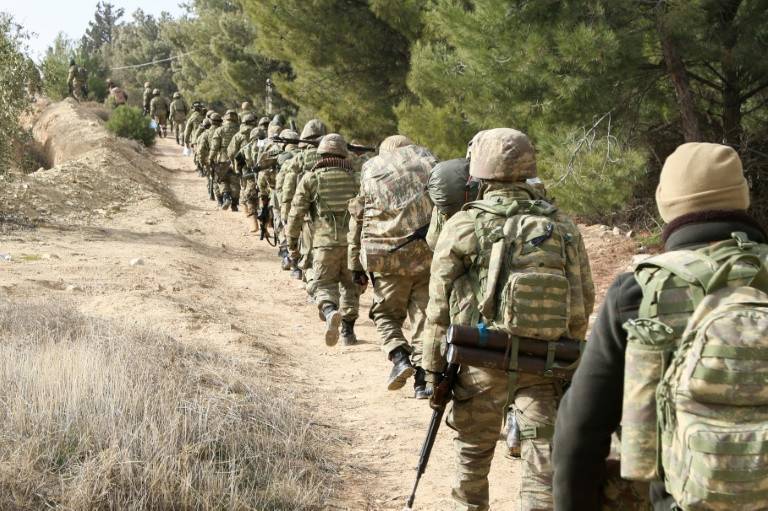KIRIKHAN - President Recep Tayyip Erdogan on Wednesday vowed to press Turkey’s offensive against a Kurdish militia in Syria until “the last terrorist” was killed, as the US ramped up its concerns over the campaign.
Turkey on Saturday launched operation “Olive Branch” together with Syrian rebels and Turkish warplanes striking targets to oust the Kurdish People’s Protection Units (YPG) militia from its Afrin enclave in northern Syria.
Erdogan said the offensive was “continuing successfully”, adding that Syrian opposition fighters and Turkish forces were “step by step taking control of Afrin”.
“Until the last terrorist is neutralised, this operation will continue,” he vowed. Ankara views the YPG as a terror group linked to the outlawed Kurdistan Workers’ Party (PKK) waging a three-decade insurgency inside Turkey and blacklisted as a terror organisation by Ankara and its Western allies.
But the YPG is still working closely with Washington against the Islamic State (IS) extremist group in Syria, in defiance of Turkey’s warnings. The YPG strongly denies it is a terror outfit.
There have been expressions of concern over Turkey’s action from its NATO allies, who fear the campaign will impede the fight against IS and harm efforts to bring peace to Syria after a nearly seven-year civil war.
US President Donald Trump is expected to raise Washington’s fears with Erdogan in telephone talks later on Wednesday. “It (the Turkish campaign) detracts from efforts to fight the Islamic State group,” said a senior US administration official.
Crucial is the attitude of Russia, which has a military presence in the area and a cordial relationship with the YPG but is also working with Turkey on a peace process. The Kremlin said Erdogan and Russian President Vladimir Putin “stressed the importance of continuing joint active work... to settle the crisis” in telephone talks late Tuesday.
Russia accuses US of ‘muddying’ gas attacks probe
The Kremlin on Wednesday accused Washington of trying to complicate international efforts to probe the use of chemical weapons in Syria and rejected accusations it was responsible for recent attacks.
The comments came after US Secretary of State Rex Tillerson said Russia bore responsibility for recently reported chemical attacks by the Syrian government in East Ghouta.
“We categorically disagree with the approach of the Americans who have essentially muddied the real investigation of previous instances” of Syria chemical attacks, said Russian President Vladimir Putin’s spokesman Dmitry Peskov.
Peskov said US officials were jumping to conclusions “without any grounds whatsoever”.
Tillerson made the charges against Russia on Tuesday as diplomats from 29 countries met in Paris to push for sanctions and criminal charges against the perpetrators of chemical attacks in Syria.
“Only yesterday more than 20 civilians, most of them children, were victims of an apparent chlorine gas attack,” Tillerson said.
“Whoever conducted the attacks, Russia ultimately bears responsibility for the victims in East Ghouta and countless other Syrians targeted with chemical weapons, since Russia became involved in Syria.”
Russia and China have blocked Western-backed efforts at the UN to impose sanctions on Damascus over their use.
After hundreds were killed in attacks near Damascus in August 2013, a landmark deal with Russia was struck to rid Syria of its chemical weapons stash, staving off US air strikes.
Despite the agreement, chemical attacks have continued.
US officials have accused Russia of failing to rid Syria of chemical weapons and blocking chemical weapons organisations.
The West has blamed the Syrian government for an April 2017 sarin gas attack on the opposition-held village of Khan Sheikhun which left scores dead.
Russia has contested the legitimacy of a chemical weapons panel known as the Joint Investigative Mechanism.
At the United Nations, Moscow is circulating a draft resolution that would establish a new investigative body to probe chemical attacks in Syria. The US indicated the Russian proposal had no chance of being adopted.






